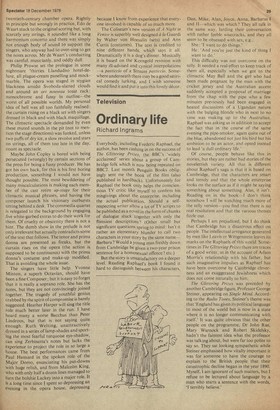Television
Ordinary life
Richard Ingrams
Everybody, including Frederic Raphael, the author, has been cashing in on the success of The Glittering Prizes, the BBC's 'widely acclaimed' series about a group of Cambridge folk which is now being repeated on BBC2. Last month Penguin Books obligingly sent me the book of the film (also published in hardback). Unfortunately for Raphael the book only helps the conscientious TV critic like myself to confirm his misgivings about the enterprise, including the actual publication. Should a selfrespecting writer allow a lot of TV scripts to be published as a novel in the form of chunks of dialogue stuck together with only the flimsiest descriptions ? (Other small but significant questions spring to mind: Isn't it rather an elementary blunder to call two characters in your story by the same name— Barbara ? Would a young man freshly down from Cambridge be given a two-year prison sentence for a homosexual offence? etc.)
But the story is unsatisfactory on a deeper level. Reading Raphael's book 1 found it hard to distinguish between his characters,
Dan, Mike, Alan, Joyce, Anna, Barbaras I and II--which was which? They all talk in the same way, larding their conversation with rather feeble wisecracks, and they all seem to be obsessed with sex, e.g.:
She: 'I want to do things.'
He: 'And you're just the kind of thing want to do.'
This difficulty was not overcome on the telly. It needed a real effort to keep track of them all, especially when we got to the climactic May Ball and the girl who had been made pregnant by the man with the cricket jersey and the Australian accent suddenly accepted a proposal of marriage from the chap with the pipe who a few minutes previously had been engaged in heated discussions of a Ugandan nature with the bulging blonde who in next to no time was making up to the Australian. Raphael was asking us in addition to accept the fact that in the course of the same evening the pipe-smoker, again quite out of the blue, abandoned not just his bird but his ambition to be an actor, and opted instead to lead 'a dull ordinary life.'
Of course, people behave like this in stories, but they are rather bad stories of the novelettish variety. All that is different about Raphael's saga is that it is based on Cambridge, that the characters are smart and trendy and that the whole enterprise looks on the surface as if it might be saying something about something. Alas, it isn't. Reading on in the book—I don't think somehow I will be watching much more of the telly version—you find that there is no real resolution and that the various themes fizzle out Perhaps I am prejudiced, but I do think that Cambridge has a disastrous effect on people. The intellectual arrogance generated by men like Leavis or Wittgenstein leaves its marks on the Raphaels of this world. Sometimes in The Glittering Prizes there are traces of a good writer, as in the account of Adam Morris's relationship with his father, but such imaginative impulses as Raphael has have been overcome by Cambridge cleverness and an exaggerated Jewishness which does not come naturally to him.
The Glittering Prizes was preceded by another Cambridge figure, Professor George Steiner, appearing on Single Mind. According to the Radio Times, Steiner's theme was that 'England has given its political language to most of the world but is now in a state where it is no longer communicating with. itself.' It was quite obvious that the other people on the programme, Dr John Rae, Mary Warnock and Robert Skidelsky, hadn't the faintest idea what the professor was talking about, but were far too polite to say so. They sat looking sympathetic while Steiner emphasised how vitally important it was for someone to have the courage to explain to the British people that their catastrophic decline began in the year 1890. Myself, I am ignorant of such matters, but I refuse to be lectured about language by a man who starts a sentence with the words, 'I terribly believe.'














































 Previous page
Previous page